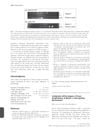 3 citations,
January 2021 in “Plastic and Aesthetic Research”
3 citations,
January 2021 in “Plastic and Aesthetic Research” Hair loss reduces hair thickness and coverage, but drug treatments mainly revive dormant hairs rather than reverse thinning; patients often undervalue their hair loss severity.
 December 2022 in “Discover Psychology”
December 2022 in “Discover Psychology” A young woman developed a bowel obstruction from eating hair from her weave to relieve anxiety.
 9 citations,
July 2010 in “British Journal of Dermatology”
9 citations,
July 2010 in “British Journal of Dermatology” The document suggests a rare skin condition might be caused by a genetic phenomenon.

The document concludes that diagnosing female hair loss requires careful examination, with treatments varying by condition and psychological support often necessary.
 125 citations,
September 2019 in “Journal of Clinical Immunology”
125 citations,
September 2019 in “Journal of Clinical Immunology” Foxp3 is crucial for regulatory T cell function, and targeting these cells may help treat immune disorders.
 January 2021 in “International journal of basic and clinical pharmacology”
January 2021 in “International journal of basic and clinical pharmacology” Hydroxychloroquine is less effective than betamethasone oral mini pulse therapy for treating alopecia areata.
 1 citations,
December 2017 in “Journal of clinical and investigative dermatology”
1 citations,
December 2017 in “Journal of clinical and investigative dermatology” Platelet-Rich Plasma (PRP) treatment can significantly increase hair count and thickness in people with Androgenetic Alopecia (AGA) with minimal side effects.
 291 citations,
January 2014 in “The Scientific World Journal”
291 citations,
January 2014 in “The Scientific World Journal” Lichen Planus is a less common condition affecting skin and mucous membranes, with various types and associated risk factors, challenging to diagnose, significantly impacts life quality, and may have a risk of cancerous changes in oral lesions.
 1 citations,
December 2022 in “Journal of cosmetic dermatology”
1 citations,
December 2022 in “Journal of cosmetic dermatology” The combination of vitamin D analogues with potent steroids is a favorable treatment for alopecia areata with fewer side effects.
14 citations,
January 2016 in “Annals of dermatology/Annals of Dermatology” Oral cyclosporine is more effective and safer than betamethasone for treating alopecia areata.
 July 2023 in “Clinical, cosmetic and investigational dermatology”
July 2023 in “Clinical, cosmetic and investigational dermatology” Plica neuropathica can be a sign of schizophrenia and improves with antipsychotic treatment.
 December 2023 in “Dermatology and therapy”
December 2023 in “Dermatology and therapy” Japanese patients and physicians often disagree on the severity of Alopecia Areata and treatment satisfaction, needing better communication and treatments.
 4 citations,
September 2017 in “Skin appendage disorders”
4 citations,
September 2017 in “Skin appendage disorders” The dog with an Alopecia Areata-like condition showed signs of an autoimmune disease and partially regrew hair without treatment, suggesting dogs could be models for human AA research.

Topical treatments like minoxidil and corticosteroids are effective for hair loss, with JAK inhibitors promising for alopecia areata.
 December 2023 in “Revista de la Facultad de Ciencias Médicas (Quito)”
December 2023 in “Revista de la Facultad de Ciencias Médicas (Quito)” Fever and rash can be early signs of lupus.
 67 citations,
January 2007 in “Environmental health perspectives”
67 citations,
January 2007 in “Environmental health perspectives” A woman's health issues were caused by arsenic poisoning from kelp supplements.
 2 citations,
March 2019 in “Veterinary dermatology”
2 citations,
March 2019 in “Veterinary dermatology” Thymoma in cats can cause hair loss without inflammation.
 6 citations,
May 2023 in “Drugs”
6 citations,
May 2023 in “Drugs” Baricitinib helps regrow hair in adults with severe alopecia better than a placebo and is approved for treatment, but long-term effects are still unknown.
 July 2023 in “Journal of Clinical Medicine”
July 2023 in “Journal of Clinical Medicine” The document concludes that understanding hair follicle histology and the hair cycle is crucial for diagnosing alopecia.
 1 citations,
March 2022 in “Journal of burn care & research”
1 citations,
March 2022 in “Journal of burn care & research” Eyebrow tinting can cause chemical burns and increased awareness of its risks is needed.
 October 2023 in “European medical journal. Dermatology”
October 2023 in “European medical journal. Dermatology” Hair loss greatly affects quality of life, and dermatologists are crucial for proper diagnosis and treatment.
17 citations,
September 2016 in “Stem cells translational medicine” Using bioreactors, scientists can grow more skin stem cells that keep their ability to regenerate skin and hair.
 October 2023 in “bioRxiv (Cold Spring Harbor Laboratory)”
October 2023 in “bioRxiv (Cold Spring Harbor Laboratory)” A protein called EGFR protects hair follicle stem cells, and when it's disrupted, hair follicles can be damaged, but blocking certain pathways can restore hair growth.
October 2017 in “The American journal of gastroenterology” Taking He Shou Wu (Polygonum multiflorum) caused liver injury in a woman using it for hair loss.
127 citations,
August 2016 in “The oncologist” Understanding and managing side effects of hedgehog pathway inhibitors can improve treatment for advanced basal cell carcinoma.
1 citations,
September 2021 in “Frontiers in Endocrinology” Minoxidil can help transgender males grow facial hair before starting testosterone therapy.
 89 citations,
June 2012 in “Anais Brasileiros de Dermatologia”
89 citations,
June 2012 in “Anais Brasileiros de Dermatologia” Actinic keratosis can lead to skin cancer, is more common in fair-skinned people, and can be reduced with sunscreen and treated effectively.
 1 citations,
May 2021 in “International Journal Of Medical Science And Clinical Invention”
1 citations,
May 2021 in “International Journal Of Medical Science And Clinical Invention” Women with PCOS may have a higher risk of severe COVID-19 due to hormonal imbalances and vitamin D deficiency.
 11 citations,
March 2021 in “Reproductive Biology and Endocrinology”
11 citations,
March 2021 in “Reproductive Biology and Endocrinology” Polycystic Ovary Syndrome (PCOS) symptoms vary globally, with bloating, high cholesterol, and glucose levels being common; the current diagnostic criteria may need refining.
 18 citations,
November 2021 in “Anais Brasileiros de Dermatologia”
18 citations,
November 2021 in “Anais Brasileiros de Dermatologia” COVID-19 can cause various skin issues, like rashes and lesions, which are more common in younger patients and can be linked to more severe complications.
























